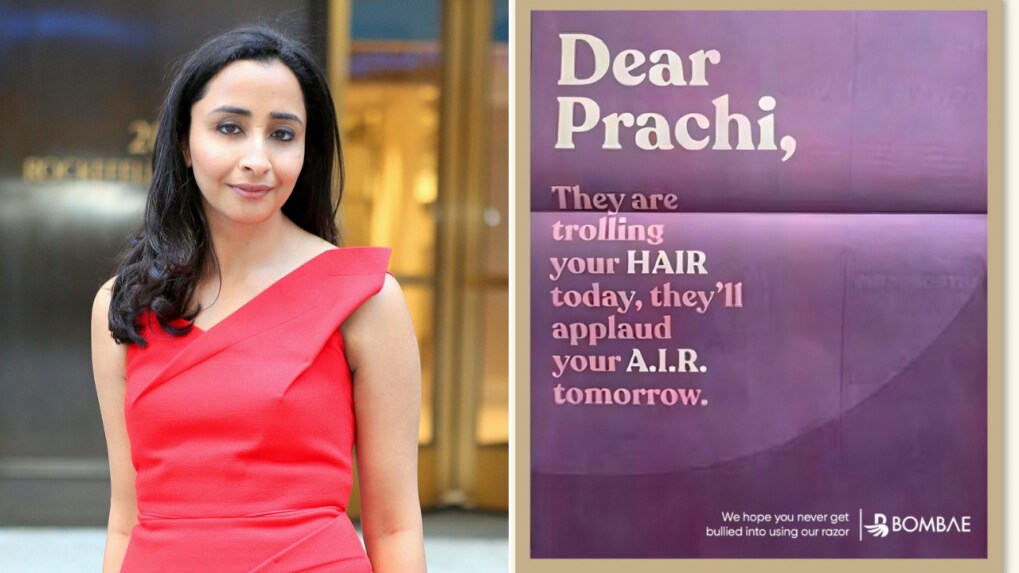Priyanka Gill weighs in on Bombay Shaving Company’s Dear Prachi ad
Priyanka Gill, Group co-founder of The Good Glamm Group and venture partner at Kalaari Capital took to LinkedIn to share her perspective on the ad that created so much social media buzz.
ADVERTISEMENT
Homegrown personal care brand Bombay Shaving Company on Saturday, released a print advertisement addressing Prachi Nigam. The ad is for BSC's female-focused brand Bombae.
Nigam made headlines recently after she topped Uttar Pradesh's Class 10 board exams. Soon after her image appeared in the press, internet trolls began mocking the teen for her facial hair. But netizens also fought back against the trolls, voicing their support of the teenage girl. Several internet users raised serious concerns about online bullying and the impact of social media trolling and abuse on person as young as Nigam.
This, of course, is a serious matter. But BSC seemed to have "commercialized" the issue with an attempt to "monetize" a young girl's story with an "opportunistic ad" that claims not to be opportunistic.
The company's founder Shantanu Deshpande shared the ad, saying, "It was shocking to see the amount of hate targeted at a teenage girl who had TOPPED AN EXAM because of her facial hair. Our simple message to this amazing young woman with such a bright future.”
He added in the post, "Love to see my team ooze class. No opportunistic sale, QR code, nothing. Just a heartfelt message to a fellow Bae.”
But the attempt to send a "heartfelt message" has fallen flat.
Priyanka Gill, Group co-founder of The Good Glamm Group and venture partner at Kalaari Capital took to LinkedIn to share her perspective on the ad that created so much social media buzz.
"The Tightrope of ‘Moment Marketing’. Moment Marketing is the most effective yet hardest type of content that a brand can do. Get it right and you go viral - for the right reasons. Get it wrong and you may still go viral - but it can hurt your brand,” she said.
“In this particular post by Bombay Shaving Company - we can see elements of all the above in play,” she added.
“Citing scenarios, Gill shared, Catch the trend in time - this they managed to do. I can totally see someone in the team say: “OMG - lets do a post”. Spotting the trend and quickly getting something out is harder to do than one might expect.”
“Get the concept right - there was one glaring issue in the conceptualization - the lack of consent. Did they get Prachi’s approval to be used in this glaringly obvious manner? If they did - it should have been mentioned. If they did not, they made a grave misstep - commercially exploiting the bullying incident, almost in the guise of celebrating and standing in solidarity with Prachi. Using “Dear Prachi…” as the approach may make the legal team comfortable - but it is not enough. If you are using a sensitive topic to market your brand - you need to go over and beyond,” Gill said.
She added, “Creative Content Copy - The line between clever and cringe is a faint one. The clumsy pun on ‘hair’ and ‘A.I.R’ is case in point. Alliteration is always good - except when it is forced. Sincere, clean copy vs the clever approach would have been better - after getting Prachi’s consent.”
“Integrating product - This is where the problem usually starts. The creative team comes up with something and the brand team goes - where is the product integration?”
‘In this case, Bombay Shaving Company faltered. They add a line saying we hope you are never bullied into using our razor. A brand is in no position to ‘hope’ one way or the other - to remove or not to remove facial hair is a personal choice. Sometimes skipping the integration is the better option - especially when your brand name is enough,” said Gill.
“The Viral Factor - Regardless of what Bombay Shaving Company did right or wrong - they got the views. All publicity is good publicity - but if you are building a brand for the long term, it is worth asking at what cost.”
“We are all talking about the ad - the brand itself got a bit bruised along the way. Ultimately brands are resilient. The Bombay Shaving Company is a much loved brand. Getting more things right than wrong in the long-term is the game - especially when done with timely introspection and course correction,” she concluded.

